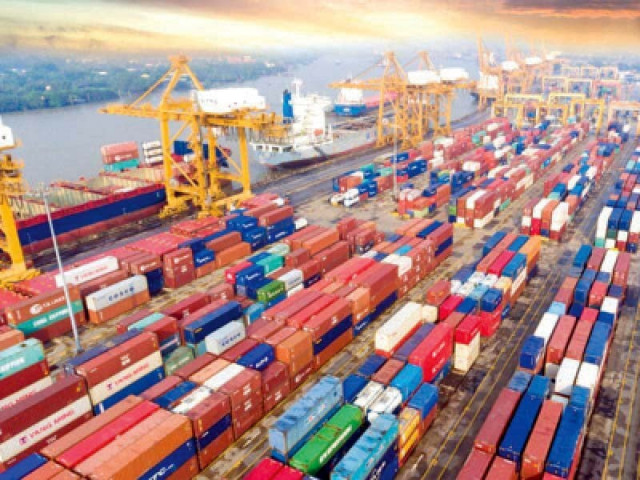Balance of payments constraint
Growth in imports will put pressure on rupee whenever economy grows at high rate

The condition of the external sector deteriorated in fiscal year 2021-22 as the projected growth of economy is around 6%.
This deterioration is the manifestation of balance of payments (BOP) constraint faced by the economy. The current account deficit turned out to be around $15 billion in the first 11 months of FY22.
The export growth remained around 27% while the import growth was around 37%. In absolute terms, exports were around $29 billion while imports crossed a staggering figure of $65 billion.
This clearly shows that export growth is achieved on the back of imports. In a growing developing economy, imports outpace exports by a significant margin and Pakistan is not an exception.
The current BOP difficulties occurred in a highly volatile international world where speculation is rife in commodities. The low international interest rate fueled speculation in commodities.
In addition, the Russia-Ukraine conflict propelled the international crude oil prices and it crossed $120 per barrel. The easing of conflict will bring it down, which would be a boon for Pakistan.
Higher commodity, especially crude oil, prices along with capital goods imports translated into a higher merchandise import bill in the outgoing fiscal year.
The Covid-19 outbreak, amnesty scheme and concessions for the real estate sector pushed up land prices. Land prices kept on increasing from July 2020 to October 2021 across Pakistan.
During this period, the prices of plots doubled in certain areas. Expatriate and domestic investors have already poured trillions of rupees in real estate owing to safety and security.
Most of them are confident that prices will keep on increasing. Investors also treat land as an asset class to secure quick capital gains.
The real estate-propelled boom created consumption boom in the economy. A chunk of people bought SUVs and others upgraded their vehicles. Consequently, the sales of cars increased.
The pent-up demand allowed dealers/ agents to book premium on the spot delivery of vehicles. Furthermore, the sales of durable consumption goods also increased.
We are a consumption-driven economy at a low level of income. The national savings rate is low as savings increase with the increase in income.
We have to depend on foreign savings to meet the requirements of consumers. Under these set of conditions, foreign exchange becomes scarce.
From the development planning perspective, the precious foreign exchange should be kept and spent on imports of capital goods. Furthermore, imports of luxury items need to be curtailed.
That is the reason some analysts argue that imports of luxury items should be banned. However, it becomes difficult to ban imports of luxury items as there is a consistent demand for these items from the middle and upper-middle class.
A consumption-driven economy jacks up merchandise imports. This nature of economy keeps the exportable surplus at low levels.
Exports rely on imported raw material and capital goods. Under these set of circumstances, it is not possible to increase exports by doling out incentives and concessions. The pace of import growth will remain higher in such an economy.
In a nutshell, the growth in imports will put pressure on the exchange rate whenever the economy grows at a high rate. As far as the case of Pakistan is concerned, the gross domestic product (GDP) can easily grow at 4% without incurring any balance of payments problems.
Any attempt to pump up the economy at a higher rate will create balance of payments difficulties, which has happened in the last two years.
Let us see how policymakers respond to this mounting challenge in the days to come.
The writer is the Assistant Professor of Economics at SDSB, Lahore University of Management Sciences
Published in The Express Tribune, July 4th, 2022.
Like Business on Facebook, follow @TribuneBiz on Twitter to stay informed and join in the conversation.


















COMMENTS
Comments are moderated and generally will be posted if they are on-topic and not abusive.
For more information, please see our Comments FAQ